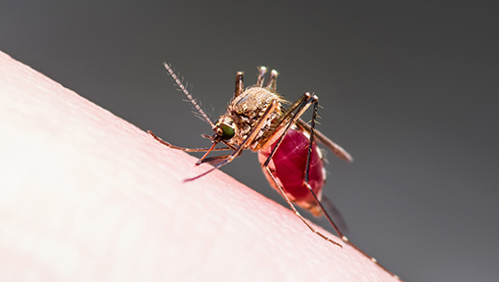
A Burnet Institute-led collaboration has used genome sequencing and genetic engineering to explain how a specially selected drug molecule or compound can prevent the malaria parasite Plasmodium falciparum from invading red blood cells.
Published in the journal PLOS Biology on World Malaria Day, the study provides new opportunities and targets for the development of much-needed new medications for malaria, which caused more than 619,000 deaths globally in 2021, due primarily to infection from P. falciparum.
Having already identified the compound as a specific inhibitor of red blood cell invasion in an earlier study, the research team used reverse genetics to discover how the drug attaches to a protein called actin, which malaria uses to break into red blood cells, where it grows and reproduces, causing illness.
“We showed that this compound affects parasite actin in such a way that it prevents it from exerting this force, this biomechanical force, thereby stopping the parasites from entering the red blood cell,” study lead author, Dr Madeline Dans, Postdoctoral Researcher at WEHI (Walter and Eliza Hall Institute), said.
“What the chemists from WEHI were able to do next was to generate much more potent forms of the drug, which is important to form the basis for a medicine so that you only need to take small amounts of it.”
Supervising author, Associate Professor Paul Gilson, Co-Head of Burnet Institute’s Malaria Virulence and Drug Discovery Group, said there’s an urgent need to develop new medicines because of growing resistance to the current generation of medicines to treat malaria.
“The current frontline medicines, parasites are becoming resistant to them, and it’s a worry because resistant mutations are popping up all around the world,” Associate Professor Gilson said.
“After these frontline medicines are exhausted then there’s nothing really to come in and take their place, so we’ve got to keep putting new compounds into the developmental pipeline.
“If we’re going to eradicate or eliminate malaria then we need to have a new generation of medicines ready for when the current ones begin to fail.”
Dr Dans said the next step to the research is to engineer a more robust form of the compound that can last long enough in the body to be an effective antimalarial medicine.
The latest World Health Organization World Malaria Report shows malaria cases trending upwards. The global tally reached 247 million in 2021 compared to 245 million in 2020 and 232 million in 2019.
This discovery was the result of a highly collaborative partnership between local teams from Burnet Institute, WEHI, Deakin University and international partners from University of Oulu, Finland, Ludwig Maximilian University, Germany and University of Bergen, Norway.
World Malaria Day is observed on 25 April each year to bring global attention to efforts to bring an end to malaria and encourage action to reduce suffering and death from the disease.

